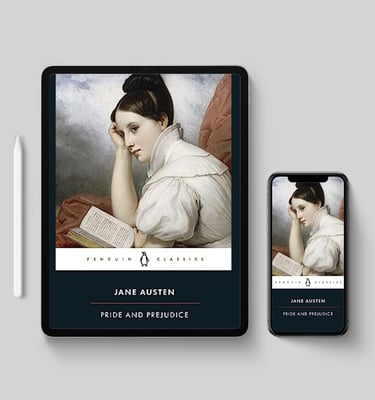Pride and Prejudice Quotes
Welcome to our curated collection of Pride and Prejudice quotes, where we've handpicked the most famous quotes and important quotes from Jane Austen's timeless classic and the 2005 film adaptation. Delve into the wit, wisdom, and keen insights of this beloved novel that continues to captivate readers and film audiences alike. Whether you're revisiting the world of Elizabeth Bennet and Mr. Darcy or discovering it for the first time, these Pride and Prejudice quotes are sure to inspire, provoke thought, and rekindle your love for literature.
We also have chapter summaries and more study resources here.
Famous or Important Quotes from Pride and Prejudice
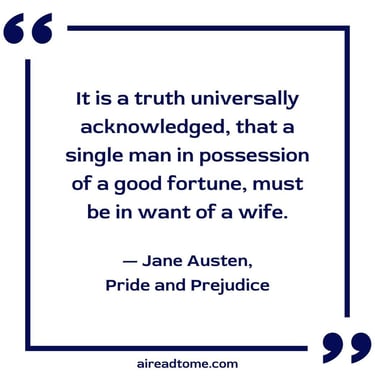

Jane Austen's opening line in Pride and Prejudice immediately introduces readers to the societal pressures and expectations of her time. The quote humorously suggests that whenever a wealthy single man is spotted, society automatically assumes he is searching for a wife. This sentiment reflects the era's emphasis on marriage as a means for social and economic advancement, especially for women. Through her wit and irony, Austen often critiques such societal norms, highlighting their absurdity and limitations.
"It is a truth universally acknowledged, that a single man in possession of a good fortune, must be in want of a wife."
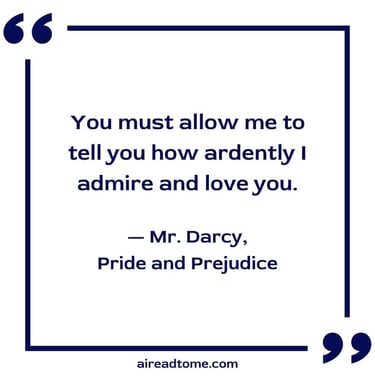

In this pivotal moment from Pride and Prejudice, Mr. Darcy candidly reveals the depth of his feelings towards Elizabeth Bennet, marking a significant turning point in their relationship. His confession, earnest and direct, contrasts with his earlier reserved and proud demeanor, showcasing a side of him that is sincere and raw. The use of "must allow" emphasizes the urgency and necessity he feels to express his emotions, even in the face of potential rejection. Through Darcy's declaration, Jane Austen explores the transformative power of love and the courage it takes to lay one's feelings bare despite societal barriers and personal apprehensions.
"You must allow me to tell you how ardently I admire and love you."
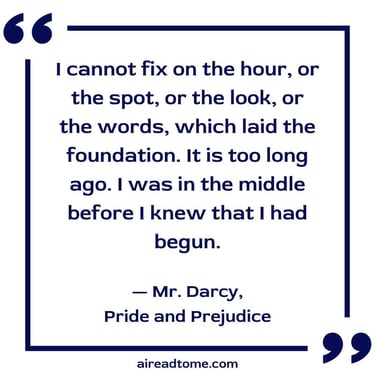

In Pride and Prejudice, Mr. Darcy's introspection reveals the inscrutable nature of falling in love, where the exact moment of its inception often remains elusive. By admitting he cannot pinpoint when his affections for Elizabeth Bennet began, Darcy emphasizes the gradual and often imperceptible evolution of deep emotions. His realization that he "was in the middle before [he] knew" underscores the overwhelming and consuming nature of love, which can take hold without one's immediate awareness. Jane Austen, through Darcy's words, paints a poignant picture of love's mysterious, yet inexorable, progression.
"I cannot fix on the hour, or the spot, or the look, or the words, which laid the foundation. It is too long ago. I was in the middle before I knew that I had begun."
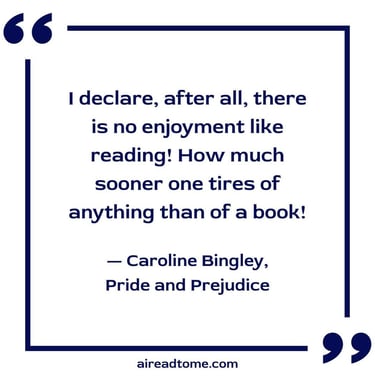

Miss Bingley's quote speaks to the timeless joy and enduring pleasure derived from reading. Within the context of the novel, this statement is laced with irony, as Miss Bingley has little genuine interest in books and merely pretends to enjoy reading to attract Mr. Darcy's attention. Jane Austen, with her characteristic wit, uses this quote to satirize those who feign interests to gain social approval. Beyond its context, the sentiment underscores the universal value and solace many find in literature, highlighting its unmatched ability to captivate and engage.
"I declare, after all, there is no enjoyment like reading! How much sooner one tires of anything than of a book!"
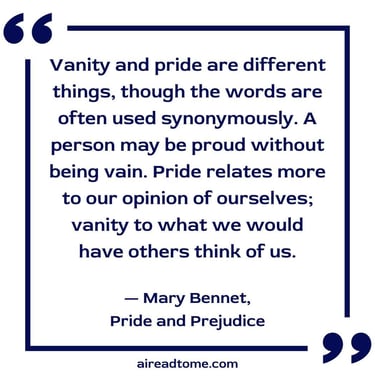

Through this quote, spoken by Mary Bennet, Jane Austen delves into the nuances of human character, emphasizing that while pride stems from one's self-regard and self-worth, vanity is rooted in the desire for external validation and how one wishes to be perceived by others. This distinction underscores the complexities of human motivation and the delicate interplay between internal self-assessment and the yearning for societal approval.
"Vanity and pride are different things, though the words are often used synonymously. A person may be proud without being vain. Pride relates more to our opinion of ourselves; vanity to what we would have others think of us."
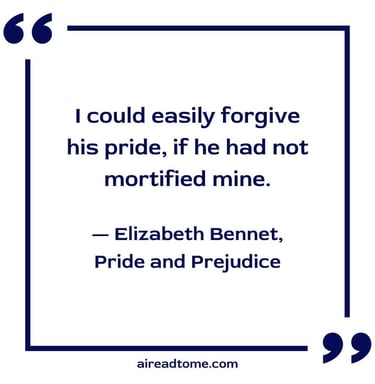

Elizabeth Bennet's declaration captures the tangled web of emotions and the intricacies of personal pride in her interactions with Mr. Darcy. Elizabeth, ever astute, conveys a willingness to overlook Darcy's evident arrogance, signaling her capacity for understanding and forgiveness. However, the hurt she feels from the slight to her own dignity is harder to dismiss, revealing the deeply personal and sensitive nature of one's self-worth. Through Elizabeth's perspective, Jane Austen delves into the complexities of human relationships, particularly the vulnerabilities exposed when pride is challenged.
"I could easily forgive his pride, if he had not mortified mine."
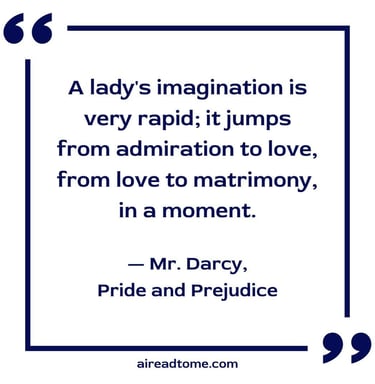

Mr. Darcy's observation to Miss Bingley is a wry commentary on the perceived hastiness of a woman's feelings, particularly in the context of romance and marriage. By suggesting that women quickly escalate their emotions from mere admiration to the prospect of marriage, Darcy jests about the societal expectations and the urgency often associated with matrimonial pursuits of the era. The statement is laced with irony and can be seen as both a playful tease and a critique of societal norms. Jane Austen, through Darcy's words, highlights the constricting views held about women's emotions and aspirations, offering a satirical perspective on the assumptions made about women's desires.
"A lady's imagination is very rapid; it jumps from admiration to love, from love to matrimony, in a moment."
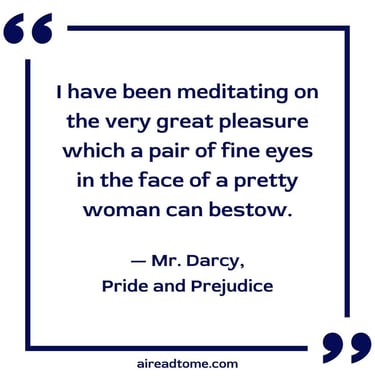

Mr. Darcy's remark reveals a softer, more contemplative side to a character often perceived as stern and reserved. His meditation on the allure of a woman's eyes, particularly Elizabeth Bennet's, showcases his growing attraction and admiration for her. This statement stands as a subtle compliment, hinting at the deeper emotions he feels but is not yet ready to fully articulate. Through such reflections, Jane Austen adeptly captures the nuanced ways in which affection can manifest and the power of subtle beauty in igniting profound emotions.
"I have been meditating on the very great pleasure which a pair of fine eyes in the face of a pretty woman can bestow."
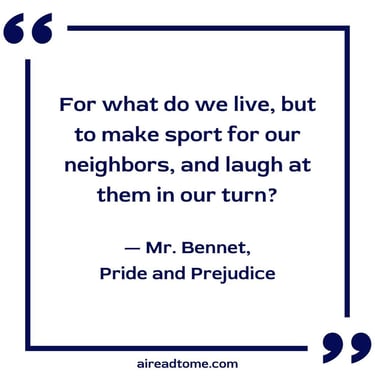

Mr. Bennet's wry observation underscores the cyclical nature of social interactions, particularly in the close-knit, gossip-fueled society of their time. He highlights the human tendency to derive amusement from the actions and missteps of others, only to later find oneself the subject of similar jest and scrutiny. This perspective offers a commentary on the superficiality of social norms and the fleeting nature of societal judgments. Through Mr. Bennet's lens, Jane Austen satirizes the pettiness of community dynamics and the ephemeral nature of reputation amidst the ebb and flow of local gossip.
"For what do we live, but to make sport for our neighbors, and laugh at them in our turn?"
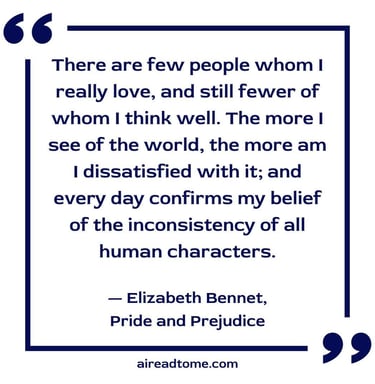

Elizabeth Bennet's reflection in Pride and Prejudice reveals a profound understanding of human nature and the complexities of relationships. Her discernment in loving and thinking well of only a few individuals underscores her selectiveness and unwillingness to bestow affection or approval without genuine merit. Elizabeth's growing disillusionment with the world indicates her disappointment with societal norms, superficiality, and the inconsistent behavior she observes in those around her. Through Elizabeth's perspective, Jane Austen critiques the societal facades and the frequent lack of genuine integrity in human interactions.
"There are few people whom I really love, and still fewer of whom I think well. The more I see of the world, the more am I dissatisfied with it; and every day confirms my belief of the inconsistency of all human characters."
Pride and Prejudice Love Quotes


In Pride and Prejudice, Mr. Darcy's reflection highlights the unpredictable journey of falling in love, where its true beginning is hard to identify. His inability to specify the starting point of his feelings for Elizabeth Bennet showcases how love can grow subtly over time. When he mentions being "in the middle" before he fully recognized it, it emphasizes how love can envelop someone unexpectedly. Through Darcy's perspective, Jane Austen illustrates the enigmatic yet inevitable development of romantic feelings.
"I cannot fix on the hour, or the spot, or the look, or the words, which laid the foundation. It is too long ago. I was in the middle before I knew that I had begun."


In a key moment from Pride and Prejudice, Mr. Darcy admits his strong feelings for Elizabeth Bennet, changing the direction of their relationship. This honest admission is different from his usual reserved nature. By saying "must allow," he shows how important it is for him to express his feelings, even if Elizabeth might not feel the same way. Through this, Jane Austen highlights the challenges and bravery of expressing love in their society.
"You must allow me to tell you how ardently I admire and love you."
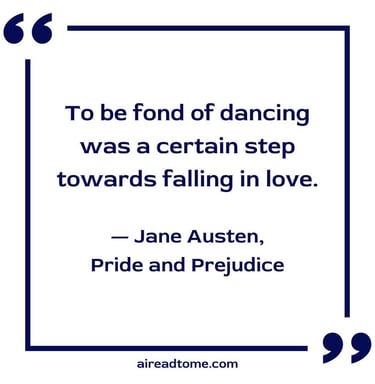

In Pride and Prejudice, the connection made between dancing and the beginnings of romantic affection serves as a commentary on the social rituals of Jane Austen's era. Dancing, a common and intimate activity during social gatherings, often provided young men and women a rare opportunity to interact closely, converse, and gauge mutual interest. This context made the ballroom a backdrop for potential romantic entanglements, where the act of dancing could spark or signify deeper attractions. Through this observation, Austen playfully highlights the significance of societal customs in shaping the dynamics of courtship and romance during her time.
"To be fond of dancing was a certain step towards falling in love."
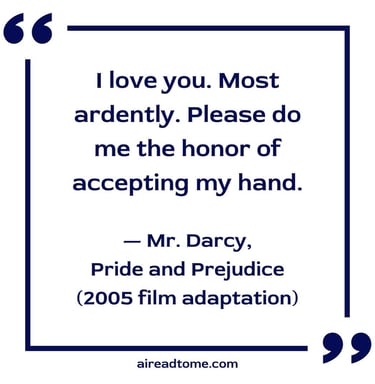

In Pride and Prejudice, Mr. Darcy's earnest plea to Elizabeth Bennet is a moment of profound vulnerability and declaration of his deep love for her. The use of the word "ardently" emphasizes the intensity of his feelings, moving beyond mere attraction to a passion that consumes him. By asking Elizabeth to "do him the honor," Darcy humbles himself, showcasing a departure from his earlier pride and demonstrating the depth of his transformation. Through this confession, Jane Austen underscores the transformative power of love and its capacity to alter character, challenge societal norms, and drive individuals to both introspection and action.
This line doesn't appear in the original Jane Austen novel.
"I love you. Most ardently. Please do me the honor of accepting my hand."
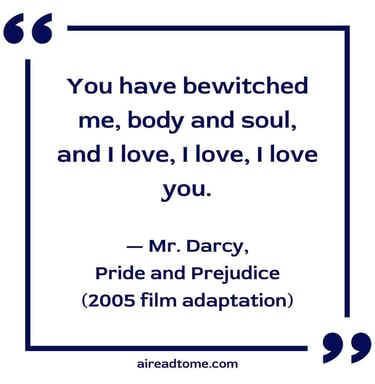

From the 2005 Pride and Prejudice film adaptation, Mr. Darcy's heartfelt confession to Elizabeth Bennet captures the totality of his profound feelings for her. The repetition and emphasis convey a love that is all-encompassing, indicating that Elizabeth has not only captivated his heart but has also deeply affected his very essence. This sentiment stands in stark contrast to Darcy's initial reserved and proud demeanor, showcasing his transformation and the depth of vulnerability he's willing to reveal. Through these words, the film illustrates the transformative power of genuine love and the lengths one might go to express an emotion so deep and overwhelming.
This line doesn’t appear in the original Jane Austen novel.
"You have bewitched me, body and soul, and I love, I love, I love you."
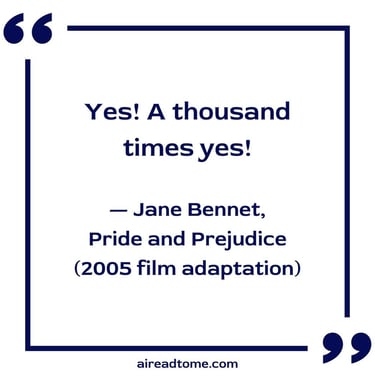

Jane Bennet's response to Mr. Bingley's proposal marks an overt departure from the typical restrained expressions of emotion characteristic of the period. Such a passionate response highlights Jane's deep and undeniable love for Mr. Bingley, emphasizing the depth of her feelings and her eagerness to embark on a life together. However, this enthusiastic phrase is not actually present in Austen's original text. Its origins are more contemporary, often used in modern literature and cinema to capture moments of intense affirmation, especially in romantic contexts.
"Yes! A thousand times yes!"
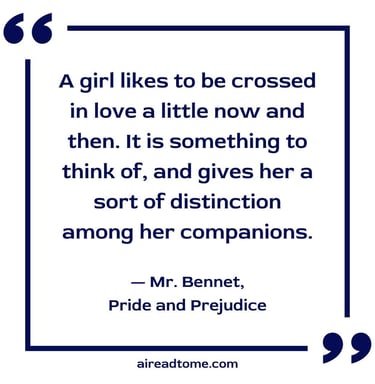

Mr. Bennet's sardonic remark reflects the romantic conventions and sensibilities of the period, suggesting that a woman derives a certain prestige from facing obstacles in her romantic pursuits. This perspective hints at the value society places on the dramatic and the sentimental, implying that a love story with challenges can be more intriguing or noteworthy than one without. His comment also underscores his characteristic wit and tendency to view societal norms with a degree of skepticism. Through Mr. Bennet's words, Jane Austen playfully critiques the romantic ideals of her time and the allure of a love narrative marked by trials and tribulations.
"A girl likes to be crossed in love a little now and then. It is something to think of, and gives her a sort of distinction among her companions."
Pride and Prejudice "I Love You" Quote
Below you will find Darcy's declaration of love from Pride and Prejudice. For shorter, more general quotes, see our Love Quotes from Pride and Prejudice.
"In vain have I struggled. It will not do. My feelings will not be repressed. You must allow me to tell you how ardently I admire and love you. I have fought against my better judgment, my family's expectations, the inferiority of your birth; my own sense of unworthiness... I love you. Most ardently. Please do me the honor of accepting my hand."
Mr. Darcy's heartfelt declaration of love to Elizabeth Bennet occurs in Chapter 34 of Pride and Prejudice. Although the exact words may vary depending on the adaptation, this version is from the 2005 film adaptation. In the book, his first proposal to Elizabeth is as follows:
“In vain have I struggled. It will not do. My feelings will not be repressed. You must allow me to tell you how ardently I admire and love you.”
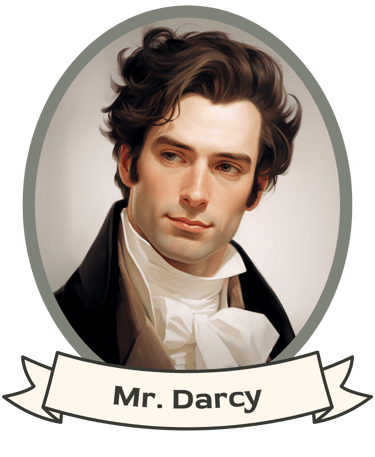

Elizabeth’s astonishment was beyond expression. She stared, coloured, doubted, and was silent. This he considered sufficient encouragement, and the avowal of all that he felt and had long felt for her immediately followed. He spoke well; but there were feelings besides those of the heart to be detailed, and he was not more eloquent on the subject of tenderness than of pride. His sense of her inferiority, of its being a degradation, of the family obstacles which judgment had always opposed to inclination, were dwelt on with a warmth which seemed due to the consequence he was wounding, but was very unlikely to recommend his suit.
In this passage, Mr. Darcy overcomes his pride and societal expectations, expressing his deep admiration, affection, and desire to marry Elizabeth despite the differences in their social status and the obstacles they have faced. His heartfelt declaration signifies a significant turning point in their relationship and marks the beginning of their journey towards mutual understanding and love.
In the final chapters of Pride and Prejudice, Mr. Darcy delivers a second declaration of love to Elizabeth Bennet. The exact wording may vary between adaptations, but the essence of his confession remains consistent. Here is a general representation of his declaration:
"I have been a selfish being all my life, in practice, though not in principle. I have been given good principles, but left to follow them in pride and conceit. Such I was, from eight to eight and twenty; and such I might still have been but for you, dearest, loveliest Elizabeth. I cannot fix on the hour, or the spot, or the look, or the words which laid the foundation. It was too long ago. But I was in the middle before I knew that I had begun. If your feelings are still what they were last April, tell me so at once. My affections and wishes are unchanged; but one word from you will silence me on this subject for ever."
In this heartfelt confession, Mr. Darcy acknowledges his past faults, his arrogance, and his journey towards self-reflection and change. He expresses how Elizabeth's influence has transformed him, emphasizing her importance in revealing the significance of character and the value of their connection. His declaration reaffirms his love and the growth he has undergone, asking for Elizabeth's hand in marriage once again. This declaration marks a significant moment of redemption and reconciliation between the two characters, leading to their eventual union.


Support Ai Read to Me
Help us create more audiobooks and release more free content! Shop our store, or purchase anything on Amazon via the book affiliate links below.
We are very grateful for your support!







